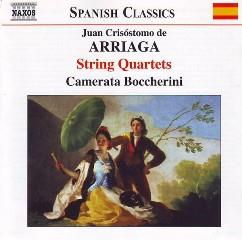Juan Arriaga - Complete String Quartets (2005)
Juan Arriaga - Complete String Quartets (2005)

Quartet No. 1 In D Minor 1 Allegro 6:47 2 Adagio Con Espressione 5:48 3 Menuetto - Allegro - Trío Piú Moderato 2:53 4 Adagio - Allegretto 7:30 Quartet No. 2 In A Major 5 Allegro Con Brio 8:10 6 Andante Con Variaciones 6:46 7 Menuetto - Scherzo - Trio 3:14 8 Andante Ma Non Troppo - Allegro 4:50 Quartet No. 3 In E Flat Major 9 Allegro 7:53 10 Pastorale - Andantino 5:46 11 Menuetto - Allegro - Trío Plus Lent 3:08 12 Presto Agitato 6:18 Camerata Boccherini: Massimo Spadano - Violin I Mauro Rossi - Violin II David Quiggle - Viola Luigi Piovano - Cello
Arriaga was born in Bilbao, Spain in 1806. His earliest known compositions are from 1817. Two years later he completed the two-act opera Los esclavos felices (The Happy Slaves) which was performed to great acclaim in 1820. The overture has been recorded several times and is the only Arriaga work that I have actually heard live. The symphony is central to his output as are the three string quartets, which were my introduction to this composer back in the mid-seventies, or rather the first two of them (Concert Hall LP - Quatuor de Genève). That record rotated quite frequently on my turntable for many years and it was only a few months ago that I reacquainted myself as part of my project of transferring old LP favourites to CD. I also did some random sampling while reviewing the present disc and was impressed by the still vivid sound and the stylish playing of the Swiss ensemble. I was just as impressed by the Camerata Boccherini, four experienced musicians who have made it their speciality to play Baroque and Classical music on authentic instruments.
Arriaga, who died before he had even turned twenty, has been called “The Spanish Mozart” but he is actually closer to Schubert in style. Rather he was developing in a Schubertian direction, which can be followed through these three quartets. The first is the most Mozartean, like the other two cast in four movements with a minuet as the third. It is a splendid work and if it had been presented as a composition by the Salzburg master it would probably have been on the music stands of every self-respecting string quartet. The opening allegro at once catches the listener with its elegance and vitality. The Camerata Boccherini dig into it, seething with energy but also phrasing with great subtlety. By comparison the Geneva players are more reserved, more classically correct. The wonderful second movement Adagio con espressione is lovingly played here, with a real glow in the impassioned eruptions and always showing great care with the dynamics. This goes for the whole disc. These are indeed highly accomplished and spirited performances, and if one now and again feels that the Geneva quartet might be just as good in their more restrained way they are not quite as exciting. Listening alternately to the two groups I have reached the conclusion that I can’t find a clear winner, but if this were boxing, Camerata Boccherini would probably get some extra points for more activity. I am not prepared to throw away the Geneva disc but I will probably play the new disc more often. And of course it includes Quartet No. 3, which has some claims to be the greatest of the three, or at least the boldest. The second movement, Pastorale – Andantino, stands out as a direct indicator of a budding romanticism with its dramatic, minatory tremolo strings. It might be a storm, as Santiago Gorostiza suggests in the liner notes, but keeping in mind Arriaga’s early excellence as a music dramatist, it could be something even more threatening. This is indeed music that anticipates the romantic opera - Verdi’s Macbeth isn’t far away. In the Presto agitato finale he also seems on his way towards new challenges. Whether he would have become a pioneer of the Romantic era had he lived longer is impossible to know but he obviously had ambitions and the three works performed here were actually published as Premier Livre de quatuors (First Book of Quartets).
These are, as I hope I have already indicated, among the freshest and most attractive string quartets of the period – or indeed the whole quartet repertoire. I strongly recommend them. There are other versions that I haven’t heard, but longstanding acquaintance with the Quatuor de Genève recording – which of course is no longer available – has convinced me that it is hard to imagine them better played than by Camerata Boccherini. And at Naxos’s give-away price everyone can afford them. ---Göran Forsling, musicweb-international.com
download (mp3 @320 kbs):
yandex mediafire ulozto gett bayfiles








